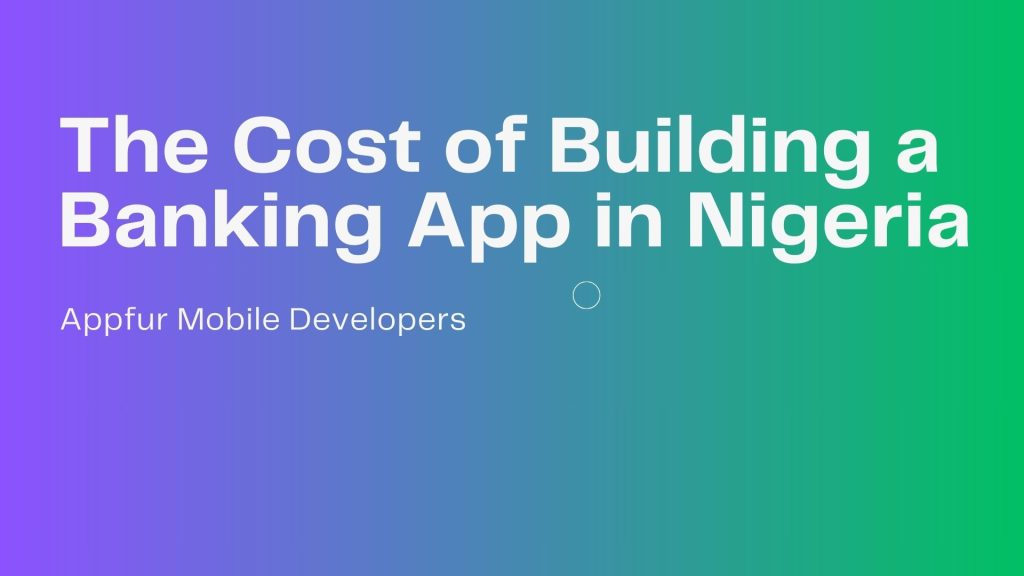Did you know The demand for digital banking solutions in Nigeria has surged, fueled by a growing tech-savvy population and increasing internet penetration. Banks and fintech companies alike are investing in mobile banking apps to meet customer expectations for seamless and secure financial services. However, the journey to creating a banking app is not without its challenges, and understanding the cost factors involved is crucial for businesses planning to venture into this space.

Key Cost Drivers of Building a Banking App
The cost of developing a banking app in Nigeria depends on several factors, ranging from app complexity to regulatory compliance. Below are the primary cost drivers:
1. Features and Functionality
The functionality of a banking app significantly influences its cost. Basic features such as account management, fund transfers, and bill payments are standard, but additional features like:
- Multi-currency support
- Advanced analytics and insights
- AI-powered chatbots
- Card management services (virtual cards, card freezing, etc.)
- Biometric authentication (fingerprint or facial recognition)
These advanced features increase development costs due to the expertise and time required to implement them.
2. Design and User Experience (UX)
A user-friendly and visually appealing app is crucial for customer retention. The cost of designing an intuitive interface may range from simple, template-based designs to more sophisticated, custom-built designs tailored to specific audiences. High-quality UX design often involves prototyping, user testing, and iterations, which can increase expenses.
3. Platform (Android, iOS, or Both)
In Nigeria, Android dominates the mobile operating system market due to the affordability of Android devices. However, for maximum reach, many businesses opt for cross-platform apps that cater to both Android and iOS users. Developing for multiple platforms increases costs, especially if you opt for native app development instead of cross-platform frameworks like Flutter or React Native.
4. Development Team
The cost of hiring a skilled development team is a major expense. Developers, UX/UI designers, quality assurance engineers, and project managers all play critical roles in app development. While outsourcing to developers in Nigeria might be more affordable than hiring internationally, the quality and experience of the team can significantly affect the final cost.
5. Third-Party Integrations
Banking apps often require integration with external APIs and services, such as payment gateways, identity verification systems, and credit bureaus. Each integration comes with its own costs, including licensing fees and implementation expenses.
6. Regulatory Compliance and Security
Nigeria’s banking sector is heavily regulated, with strict guidelines from the Central Bank of Nigeria (CBN) to ensure customer data protection and financial security. Compliance with standards like PCI DSS (Payment Card Industry Data Security Standard) and GDPR (General Data Protection Regulation) is non-negotiable, adding to development and maintenance costs. Additionally, implementing robust security measures, such as end-to-end encryption and fraud detection systems, is essential.
7. Maintenance and Updates
The development process doesn’t end with the app’s launch. Regular updates, bug fixes, and server maintenance are necessary to ensure optimal performance and address evolving customer needs. These ongoing expenses should be factored into the total cost.
Other Influential Factors
Infrastructure Costs
Hosting and server infrastructure are critical to support the backend operations of a banking app. The choice between cloud-based services like AWS, Microsoft Azure, or Google Cloud and self-hosted solutions impacts the cost structure. Cloud services typically charge based on usage, while self-hosting requires significant upfront investment in hardware and security.
Testing and Quality Assurance
Rigorous testing is required to ensure the app’s functionality, security, and performance. Costs associated with manual and automated testing can increase depending on the app’s complexity and the need for thorough penetration testing to identify vulnerabilities.
Marketing and User Acquisition
Building the app is only part of the equation. Attracting users through marketing campaigns, partnerships, and onboarding incentives requires additional investment. Digital marketing strategies, including social media ads, search engine optimization (SEO), and influencer partnerships, can vary in cost based on scale and duration.
Estimated Cost Range
The cost of building a banking app in Nigeria can vary widely based on the factors outlined above. Below is a rough estimate:
- Basic App: NGN 5 million – NGN 15 million (Simple features, limited integrations, single platform)
- Mid-Range App: NGN 15 million – NGN 30 million (Advanced features, multi-platform, custom UI/UX)
- Enterprise-Grade App: NGN 30 million – NGN 70 million+ (Highly complex features, robust security, extensive third-party integrations)
Tips to Optimize Costs
- Start with an MVP: Launch a Minimum Viable Product (MVP) to test the market and gather user feedback before investing in a full-featured app.
- Leverage Cross-Platform Development: Frameworks like Flutter or React Native can save time and money by enabling a single codebase for both Android and iOS.
- Outsource Smartly: Consider outsourcing to experienced local developers or firms that understand the Nigerian market and regulatory landscape.
- Plan for Scalability: Invest in scalable infrastructure to accommodate future growth and avoid costly overhauls.
- Streamline Features: Focus on essential features initially, and introduce advanced functionalities gradually based on user feedback and demand.
Conclusion
Building a banking app in Nigeria is a significant investment, but it’s one that can yield substantial returns in a rapidly digitalizing economy. By understanding the key cost drivers and planning strategically, businesses can create apps that not only meet customer needs but also achieve long-term success in the competitive financial landscape. As the fintech sector continues to grow, the right approach to app development can position your business at the forefront of innovation, offering value to customers and driving financial inclusion.
If your looking at building a banking app in Nigeria, Kindly reach out to us at info@appfur.com.ng or call +234 916 674 3190
We design and build high-quality, scalable mobile apps tailored to your needs.
Let’s talk! Message us on WhatsApp now: Click Here
Your next big app starts here!
